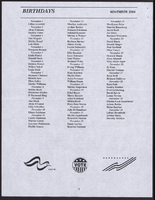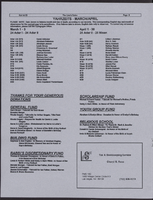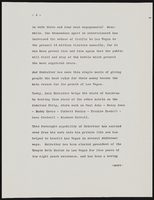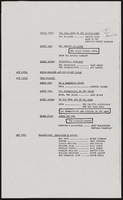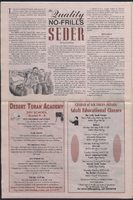Search the Special Collections and Archives Portal
Search Results

Transcript of interview with Doug Unger by Barbara Tabach, August 26, 2014
Date
Archival Collection
Description
Interview with Doug Unger by Barbara Tabach on August 26, 2014. In the interview, Unger discusses his schooling, his family's mattress business, and his endeavors in the company and the mattress industry in Las Vegas. Unger becomes involved in Holocaust education and the Sperling Kronberg Mack Holocaust Resource Center.
Doug Unger was born in Cleveland, Ohio, and grew up working summers in a mattress factory, a family business started by his maternal grandfather. After graduating from high school in Cleveland, Doug attended the University of Cincinnati until moving to Steamboat Springs, and enrolled in Denver University, though ended his college career one class away from graduation. Eventually, Unger moved back to Cleveland, then to Las Vegas. In 1976, Dough bought Supreme Mattress and moved to Las Vegas to build his new business. Outside his successful career, Doug was always an active member in the city's Jewish community. He joined Congregation Ner Tamid, where he was a trustee. He became involved with the Jewish Federation, serving as treasurer and later as president. When he moved to Reno, Doug joined Temples Sinai and Emanu-el, and also became heavily involved with Guide Dogs for the Blind Friends Committee, serving as its director for a period of time. He was also the co-chair of the Governor's Advisory Council on Education Related to the Holocaust (GAC). Doug was instrumental in establishing the Library for Holocaust Studies as a successful organization, independent of the Jewish Federation. The Library is now located in its own, donated space, run by trained staff, and receives $200,000 from the state biennially.
Text
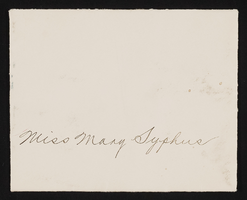
Wedding announcement and two envelopes from Aggie Herrick, Ogden, Utah to Mary Etta Syphus, Panaca, Nevada
Date
Archival Collection
Description
From the Syphus-Bunker Papers (MS-00169). The folder contains a wedding announcement, two envelopes, a typed transcription of the wedding announcement and envelopes, a copy of the wedding announcement.
Text

Transcript of interview with Laura & Don Garvin by Michael Martocci, March 3, 1979
Date
Archival Collection
Description
On March 3, 1979, Michael Martocci interviewed Laura (born in California) and Don Garvin (born in Goldfield, Nevada) about their lives in Las Vegas, Nevada. The two provide details on their family background, the first sources of water in Las Vegas, and the early city limits. They also describe their early occupations, religion, gambling, the Mormon Fort, and the effects of the Great Depression. The interview concludes with a brief discussion on the development of the Las Vegas Strip and recreational activities.
Text

Transcript of interview with Doris, Gerald and Marcy Welt by Barbara Tabach, November 30, 2014
Date
Archival Collection
Description
Interview with Doris, Gerald "Jerry", and Marcy Welt by Barbara Tabach on November 30, 2014. In this interview, the Welts discuss how they came to Las Vegas in the early 1970s from California, and Eli Welt's pawnshop, Stoney's, which he acquired from Doris's father, Jerry Fox. Jerry and Marcy talk about how they met and came to Las Vegas, where Jerry worked for Harry Reid's law firm. They talk about the community that existed in Las Vegas at the time, and their involvement with B'nai B'rith.
Just before the start of the Great Depression, Doris Fox was born in Detroit, Michigan. At the age of fifteen, she met Eli Welt, and the two were married three years later in Alexandria, Louisiana, where Eli was stationed with the United States Army Air Corps. Eventually, Doris and Eli moved to southern California with their three children-Gerald (aka Jerry), Richard (aka Rick) and Susan (aka Sue). In 1971, after all their children were out of the house, Doris and Eli moved to Las Vegas. They followed Doris' father, Jerry "Stoney" Fox, who had moved to the city in the 1940s, and was one of the first entrants into the local pawnshop industry. Like many migrants to the city, Eli became active in the Jewish community, particularly with B'nai Brith and Jewish Family Service Agency. Doris and Eli's eldest son, Jerry, and wife, Marcy, moved to Las Vegas in 1972 with their two small children. Tiffany and Cory. Jerry and Marcy had met through a Jewish youth group as teenagers in Anaheim, California. Having just finished law school, Jerry found that legal career opportunities were plentiful in the growing city. His first job was as a law clerk with Harry Reid's law office, Beckley, DeLanoy, Jemison and Reid, later becoming an associate attorney. He assisted Reid as lieutenant governor and on his early political campaigns. Jerry left Beckley, DeLanoy, Jemison and Reid to work for Oscar Goodman's firm-Goodman, Snyder and Gang-focusing on civil litigation. In 1975, Jerry opened his own practice, continuing to specialize in civil ligation, and served as general counsel to Las Vegas Clark County Library District. Since their arrival, Marcy and Jerry have been dedicated to community service, particularly within the Jewish community. Both were active in youth programs at Temple Beth Sholom, Jerry even serving as youth commissioner and later, education director. Marcy worked with Edythe Katz at the Holocaust Resource Center and assisted with producing a film and training program for educators. Both are avid supporters of youth travel to Israel and work hard to ensure these opportunities continue to be available for those interested.
Text

Transcript of interview with Rabbi Bradley Tecktiel by Barbara Tabach, April 19, 2016
Date
Archival Collection
Description
Rabbi Bradley Tecktiel was born June 28, 1968 in Chicago, Illinois. He moved to New York City to attend university, where he received two Bachelor of Arts degrees: one from List College and one from Columbia University. He went on to achieve a Master?s degree from the Jewish Theological Seminary. Soon after graduating in 1996, Rabbi Tecktiel accepted his first clergy position in New Rochelle, New York. From there he went on to lead a congregation in Louisville, Kentucky, before eventually moving to Las Vegas to become the spiritual leader of Midbar Kodesh Temple in 2008. In this interview, Rabbi Tecktiel discusses the path that eventually brought him, his wife, Susan, and their three children to Las Vegas. He talks about his passion for developing Jewish community engagement and programming, and specifically about Midbar Kodesh Temple initiatives, including Yom HaShoah and educational programming. In addition, Rabbi Tecktiel reflects upon the growth of the Jewish community, both those affiliated and unaffiliated, and the impact of Jews on Las Vegas?, as well as Nevada?s, development.
Text

